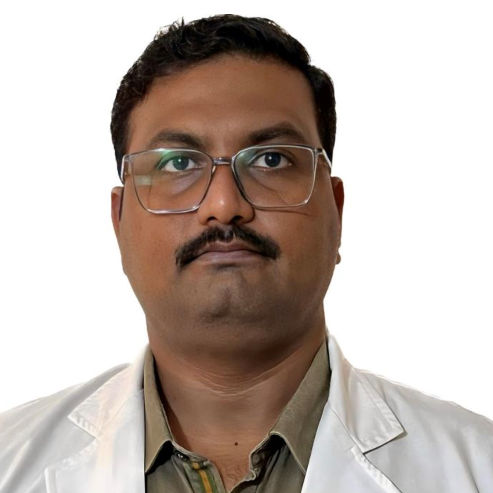Emphysema Overview: Symptoms, Causes, and Treatment
Explore emphysema, a chronic lung condition that affects breathing. Learn about its symptoms, causes, risk factors, and available treatment options to manage the disease and improve lung function.

Written by Dr. Shaik Abdul Kalam
Reviewed by Dr. Rohinipriyanka Pondugula MBBS
Last updated on 13th Jan, 2026

Emphysema is a chronic lung condition that makes breathing difficult. It is a type of Chronic Obstructive Pulmonary Disease (COPD) and primarily affects the air sacs (alveoli) in the lungs, damaging them over time. This damage reduces the lungs' ability to transfer oxygen into the bloodstream, leading to shortness of breath and other complications.
If you or a loved one has been diagnosed with emphysema, understanding the condition can help manage symptoms and improve quality of life. Let’s explore its symptoms, causes, and treatment options in simple terms.
Symptoms of Emphysema
Emphysema develops slowly, and symptoms may not appear until significant lung damage has occurred. Common signs include:
- Shortness of breath (especially during physical activity)
- Chronic cough (often with mucus)
- Wheezing (a whistling sound while breathing)
- Tightness in the chest
- Fatigue (feeling unusually tired)
- Frequent respiratory infections (like bronchitis)
- Bluish lips or fingernails (in severe cases, due to low oxygen levels)
If you experience these symptoms, especially if you smoke or have a history of lung disease, consult a doctor for proper diagnosis.
Consult a Top Pulmonologist
Causes and Risk Factors
The primary cause of emphysema is long-term exposure to lung irritants, such as:
- Smoking (the leading cause, nearly 80-90% of cases are linked to smoking)
- Secondhand smoke (breathing in smoke from others)
- Air pollution (dust, chemical fumes, industrial pollutants)
- Genetic factors (a rare condition called Alpha-1 Antitrypsin Deficiency can cause early-onset emphysema)
Other risk factors include:
- Age (most people develop symptoms after 40)
- Occupational hazards (working in coal mines, construction, or factories with chemical exposure)
How Emphysema Affects Your Health
Emphysema damages the air sacs (alveoli) in the lungs, reducing their elasticity. Over time, the walls between these sacs break down, creating larger but fewer air spaces. This means:
- Less oxygen enters the bloodstream → leading to fatigue and difficulty breathing.
- Trapped air in the lungs → making it harder to exhale fully.
- Increased risk of complications like pneumonia, heart problems, and collapsed lungs (pneumothorax).
Without proper management, emphysema can severely impact daily life, making even simple activities like walking or climbing stairs challenging.
Diagnosis and Treatment Options
Below are the diagnosis and treatment options,
How is Emphysema Diagnosed?
Doctors use several tests to confirm emphysema:
1. Lung Function Tests (Spirometry) – Measures how much air you can exhale and how quickly.
2. Chest X-ray or CT Scan – Helps visualize lung damage.
3. Blood Tests – Checks oxygen levels and detects genetic conditions like Alpha-1 deficiency.
Treatment and Management
While emphysema has no cure, treatments can slow its progression and improve quality of life.
1. Medications
- Bronchodilators – Relax airway muscles to ease breathing.
- Steroids – Reduce inflammation in the lungs.
- Antibiotics – Treat infections that worsen symptoms.
2. Oxygen Therapy
- For severe cases, supplemental oxygen helps maintain adequate oxygen levels.
3. Pulmonary Rehabilitation
- A supervised program that includes breathing exercises, nutrition advice, and physical training to strengthen the lungs.
4. Surgery (In Severe Cases)
- Lung Volume Reduction Surgery – Removes damaged lung tissue.
- Lung Transplant – Considered in extreme cases.
Lifestyle Changes to Manage Emphysema
Making healthy choices can slow disease progression and improve breathing:
- Quit Smoking – The most crucial step to prevent further damage.
- Avoid Pollutants – Stay indoors on high-pollution days, use air purifiers.
- Exercise Regularly – Walking, yoga, and breathing exercises help strengthen lungs.
- Eat a Balanced Diet – Focus on lean proteins, fruits, and vegetables to maintain energy.
- Get Vaccinated – Flu and pneumonia shots reduce infection risks.
- Practice Breathing Techniques – Pursed-lip breathing helps control shortness of breath.
When to See a Doctor?
If you experience:
- Worsening shortness of breath
- Increased mucus production
- Blue lips or nails
- Extreme fatigue
Seek medical help immediately. Early diagnosis and treatment can prevent complications.
Need Expert Advice?
If you suspect emphysema or need guidance on managing COPD, Apollo 24|7 offers expert pulmonology consultations. You can book an online appointment or schedule a lung function test from the comfort of your home.
Final Thoughts
Living with emphysema can be challenging, but with proper care, medication, and lifestyle changes, you can lead an active life. The key is to stop smoking, avoid lung irritants, and follow your doctor’s advice. Remember, early intervention makes a big difference, so don’t ignore persistent breathing problems. Stay informed, stay proactive, and take charge of your lung health!
Consult a Top Pulmonologist
Consult a Top Pulmonologist

Dr. P Sravani
Pulmonology Respiratory Medicine Specialist
3 Years • MBBS, MD
Visakhapatnam
Apollo Clinic Vizag, Visakhapatnam

Dr. Kohena Roy
Pulmonology Respiratory Medicine Specialist
8 Years • MBBS, MD Respiratory Medicine
Rajpur Sonarpur
SRL Diagnostics Pvt. Ltd, Rajpur Sonarpur
Dr. Ambuj Kumar
Pulmonology Respiratory Medicine Specialist
10 Years • MBBS, MD (Pulmonary Medicine)
New Delhi
Smriti Gynaecology and Lung Centre, New Delhi

Dr Rakesh Bilagi
Pulmonology Respiratory Medicine Specialist
10 Years • MBBS MD PULMONOLOGIST
Bengaluru
Apollo Clinic, JP nagar, Bengaluru

Dr. E Prabhakar Sastry
General Physician/ Internal Medicine Specialist
40 Years • MD(Internal Medicine)
Manikonda Jagir
Apollo Clinic, Manikonda, Manikonda Jagir
(175+ Patients)
Consult a Top Pulmonologist

Dr. P Sravani
Pulmonology Respiratory Medicine Specialist
3 Years • MBBS, MD
Visakhapatnam
Apollo Clinic Vizag, Visakhapatnam

Dr. Kohena Roy
Pulmonology Respiratory Medicine Specialist
8 Years • MBBS, MD Respiratory Medicine
Rajpur Sonarpur
SRL Diagnostics Pvt. Ltd, Rajpur Sonarpur
Dr. Ambuj Kumar
Pulmonology Respiratory Medicine Specialist
10 Years • MBBS, MD (Pulmonary Medicine)
New Delhi
Smriti Gynaecology and Lung Centre, New Delhi

Dr Rakesh Bilagi
Pulmonology Respiratory Medicine Specialist
10 Years • MBBS MD PULMONOLOGIST
Bengaluru
Apollo Clinic, JP nagar, Bengaluru

Dr. E Prabhakar Sastry
General Physician/ Internal Medicine Specialist
40 Years • MD(Internal Medicine)
Manikonda Jagir
Apollo Clinic, Manikonda, Manikonda Jagir
(175+ Patients)


.webp)

